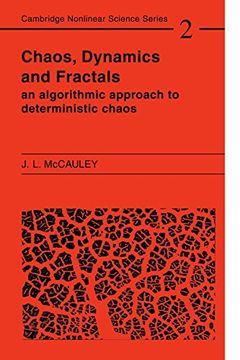Compartir
Chaos, Dynamics, and Fractals: An Algorithmic Approach to Deterministic Chaos (Cambridge Nonlinear Science Series) (en Inglés)
Joseph Mccauley (Autor)
·
Cambridge University Press
· Tapa Blanda
Chaos, Dynamics, and Fractals: An Algorithmic Approach to Deterministic Chaos (Cambridge Nonlinear Science Series) (en Inglés) - Joseph Mccauley
$ 320.388
$ 533.980
Ahorras: $ 213.592
Elige la lista en la que quieres agregar tu producto o crea una nueva lista
✓ Producto agregado correctamente a la lista de deseos.
Ir a Mis Listas
Origen: Estados Unidos
(Costos de importación incluídos en el precio)
Se enviará desde nuestra bodega entre el
Martes 11 de Junio y el
Martes 25 de Junio.
Lo recibirás en cualquier lugar de Colombia entre 1 y 5 días hábiles luego del envío.
Reseña del libro "Chaos, Dynamics, and Fractals: An Algorithmic Approach to Deterministic Chaos (Cambridge Nonlinear Science Series) (en Inglés)"
This book develops deterministic chaos and fractals from the standpoint of iterated maps, but the method of analysis and choice of emphasis make it very different from all other books in the field. It is written to provide the reader with an introduction to more recent developments, such as weak universality, multifractals, and shadowing, as well as to older subjects such as universal critical exponents, devil's staircases, and the Farey tree. Throughout the book the author uses a fully discrete method, a "theoretical computer arithmetic," because finite (but not fixed) precision is a fact of life that cannot be avoided in computation or in experiment. This approach leads to a more general formulation in terms of symbolic dynamics and to the idea of weak universality. The author explains why continuum analysis, computer simulations, and experiments form three entirely distinct approaches to chaos theory. In the end, the connection is made with Turing's ideas of computable numbers. It is explained why the continuum approach leads to predictions that are not necessarily realized in computations or in nature, whereas the discrete approach yields all possible histograms that can be observed or computed.

